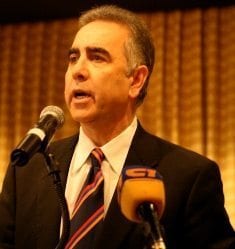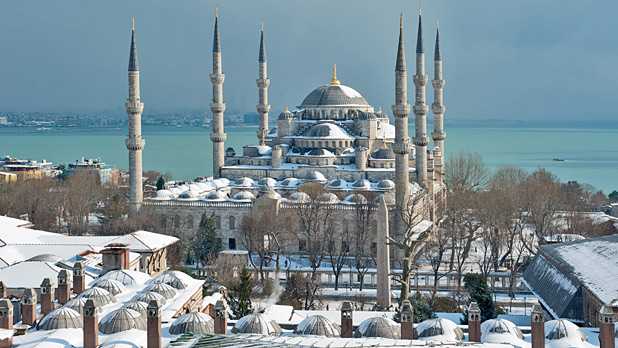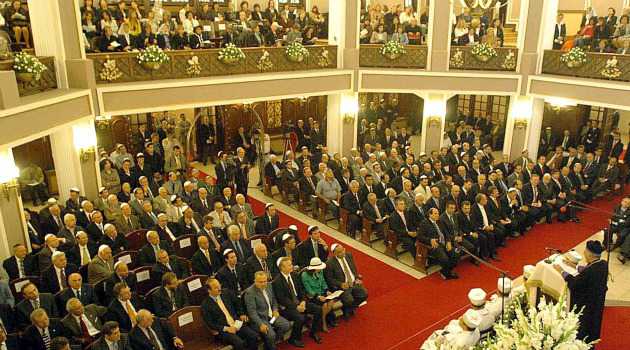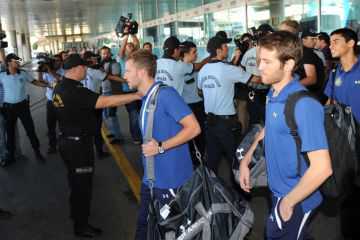



Gravestones and bones from an ancient Turkish Jewish cemetery were unearthed during the construction of an underground tunnel.
The remains in the Turkish city of Izmir were found more than 20 feet below ground, the Hurriyet Daily News reported Wednesday.
According to Hurriyet, the gravestones were left in the ground and the bones were delivered to representatives of Izmir’s Jewish community.
The bones will be reburied in the Altındag Jewish Cemetery, which remains open to Jewish burials, Izmir Jewish community chairman Jak Kaya told Hurriyet.
The cemetery disturbed by the construction work served the Jewish community during the 19th century, Kaya told Hurriyet.
In a letter to Turkey’s Culture Ministry, the Jewish community requested permission for the removal and transfer of the gravestones, according to Hurriyet.
Izmir was home to approximately 40,000 Jews in 1868, making it the third largest Jewish community in the Ottoman Empire after Salonika and Istanbul, according to Beit Hatfutsot: The Museum of the Jewish People. There are now about 2,400 Jews in Izmir.
via Jewish cemetery unearthed during construction work in Turkey | World | Jewish Journal.


A lot of people don’t know that, for nearly thirty years, Istanbul had its own working matzo factory, or that Istanbul still has its own non-working matzo factory. Known in Turkish as the “doughless oven,” located in Galata, on the northern bank of the Golden Horn, it has been given over to the arts. I recently went there to see “An Attempt at Exhausting a Place,” an exhibit by four young Turkish-Jewish artists.
I met the curator, Lara Fresko, at the SALT Galata art space, where she works. (Items on display at SALT, which is housed in the former headquarters of the Ottoman Bank, include several title deeds of mansions mortgaged in the eighteen-eighties by destitute pashas.) Fresko, who is twenty-six and has an absolutely perfect profile, led me down a winding side street lined by hardware-supply shops. Heaps of mismatched screws, plugs, cogs, and valves lay on tables and in bins, as if the world’s biggest machine had been dismantled for quick sale.
The factory was set off from the street in a courtyard. Kosher Turkish pastrami hung peacefully from a doorway. In a white room, the dormant twenty-one-meter-long matzo machine was silently gathering dust. I walked around its perimeter, wondering which end the matzo had come out of.
The machine had stopped running in 2007, after visiting rabbis found that some batches of matzo didn’t meet the regulations to be kosher. Maintaining the aging Turkish apparatus, with its frequent need of repairs and replacement parts, turned out to be more costly than importing matzo from Israel, where state-of-the-art factories were churning out two tons of product a day. It might seem ironic to mass-produce and export a kind of bread that derives its importance from the fact that it was made on the run. Nonetheless, Israel now supplies all of Turkey’s matzo.
From the machine room, I followed Fresko upstairs to a loft with skylights. Smokestacks rose from the floor and went out the ceiling, releasing imaginary smoke. The exhibit, organized with help from Jasmine Taranto, included works by Reysi Kamhi, Eytan Ipeker, Neşe Nogay, and Sibel Horada. I was particularly drawn to Horada’s “Untitled Machine”: a row of old tube TV sets showing the matzo machine in grinding, clanging action. Each TV displayed a different section of the machine, producing the effect of a phantasmal assembly line.
Horada had originally titled the work “One Last Time,” reflecting her intention to bake one last batch of matzo in the machine. There had been problems with the gas and the heater, and one of the belts snapped, and then it turned out that, if people were going to actually eat the matzo, the whole apparatus would have to be disassembled for cleaning. “The Jewish people made matzo while running away from the Pharaoh in the desert,” Horada told me. “But I couldn’t do it in this factory.” She had eventually decided to load the machine with sheets of paper instead of dough. The paper rectangles, which came out imprinted with tiny squares, resembled ghost matzos. Horada sees the machine itself as a ghost, hanging bulkily around the world, no longer used but not yet discarded.
The first thing one notices about Horada is her brilliant red hair, which she periodically collects and assimilates into an evolving sculpture called “Continuous Monument” (2002-present). During her childhood in Istanbul, Horada ate matzo from the factory every Passover, without knowing where it came from. It was apparently typical of Turkish Jewish institutions that one didn’t always know where they were. After the 1986 shooting at Galata’s Neve Shalom synagogue, security measures were upped to the extent that going to parties at the Jewish social club now felt like reporting to a secret bunker. Entry was via “the aquarium”: two steel doors, separated by a chamber with a bulletproof one-way mirror. If the guard behind the mirror didn’t recognize you, you had to hold up your Turkish I.D., which specifies the bearer’s religion.
Attending a secular high school while occasionally celebrating Purim in a bunker, Horada often felt that she was living a double life. That’s why the opening of this exhibit was a revelatory moment for her, bringing together those two of Istanbul’s most “isolated, exclusive, and invisibly hierarchical” groups, between which her life had long been divided: the Jews and the art scenesters.
The Jewish population of Turkey, estimated between eighteen thousand and twenty thousand, is descended largely from refugees of the Spanish Expulsion. The print edition of the Turkish-Jewish weekly, Salom, still runs one page in Ladino, making it one of the world’s last remaining Ladino periodicals. The entire community, which includes a small Ashkenazi minority, recognizes the Chief Rabbinate in Istanbul, and helps to maintain the city’s Jewish school, hospital, and retirement home. Highly assimilated with Turkish culture, Istanbul’s Jews are nonetheless bound together by powerful and often invisible ties. “The machine worked in secret for nearly thirty years,” Horada says of the matzo factory, “holding together the Jewish community.”
For the first year after the factory closed, Horada recalls, people complained about the Israeli matzo. They said it tasted different. The second year, nobody complained anymore. It was as if they had all forgotten. This was strange, since both Turkish and Jewish cultures tend to place a high value on complaining. But that’s just how quickly and insidiously history was moving. Istanbul, by its many names, has always been a city of transformation, conquest, destruction and rebirth. But the new developments, Horada says, are different—faster, and sneakier. “You can see a crusade, or a fire. Today’s changes are felt by everyone, but they can’t be seen.”
The invisible hand is shuffling things around, moving the people and mutating the places, and Horada wants to see it happen. Whether she is transferring the process of matzo manufacture onto paper, or building a monument to ten years of hair, she’s usually trying to make historical change visible.
On my way out, I stopped to talk to the building watchman, whom I found chain-smoking in a small office. From this watchman, who had once been the factory overseer, I learned that the matzo machine had run for ten weeks a year, sending matzo as far as Antakya and Azerbaijan, and that the thirty workers who operated it had all been formerly employed by a biscuit factory.
“What happened to the workers?” I asked.
“They went back to their village. Like the machine, we all got old and retired.”
When asked his opinion of the exhibit, the watchman shrugged. He thought it was O.K., but he didn’t like the title, “An Attempt at an Exhausting Place.” Having missed the allusion to an experimental text by the Oulipo writer Georges Perec, he thought it made the place sound finished, used up. “The machine is still here. It still works,” he said. “If they fixed it, it would run for another thirty years.”
Sibel Horada, “Untitled Machine,” mixed media installation, 2012. Photograph by Sevim Sancaktar.

Rabbi Haleva tells Ynet of post-Marmara era, says Turkish Jews aren’t suffering from anti-Semitism. ‘We went through tough days, but no security problems’
Tzofia Hirschfeld
Turkey’s Jewry, which used to be one of the most influential Jewish communities in the Middle East, has turned into its own shadow since the Marmara affair.
It is a community which is trying with all its might to convey the feeling that nothing has changed, but the great efforts invested in saying that “everything’s fine” reveal its insecurity.
Hubris
‘Turkey’s policies brought Israel to its knees’ / Ynet
Ankara’s Foreign Minister Ahmet Davutoglu boasts Turkey’s firm Middle East policies have isolate Israel even further both regionally and internationally
Turkey’s Chief Rabbi Yitzchak Haleva visited Israel last week as part of a conference initiated by Prof. Shmuel Refael, director of the Naime and Yehoshua Salti Center for Ladino Studies at Bar-Ilan University.
Haleva was happy to answer any question regarding Turkey’s Jews or Ladino, but did not offer much on Turkish Prime Minister Recep Tayyip Erdogan or his stand regarding the diplomatic crisis with Israel.
“We don’t intervene in political issues,” he clarifies in a conversation with Ynet. “We have a good relationship with the government, and when we encounter problems we turn to them and they help us.
“We have a good relationship with the prime minister, who listens to our problems and tries to help. We act like a good community and don’t take a political stand.”
המרמרה עוגנת באיסטנבול (צילום
:AP)
Marmara docks in Istanbul (Photo: AP)
Asked to address the problems encountered by the community, Rabbi Haleva avoids the security-related issues, like reinforcing security outside synagogues, and focuses on less essential difficulties.
“The Jewish cemetery has filled up,” he says. “We turned to the local authority and were given a special area to set up a new Jewish cemetery.”
‘Unpleasant atmosphere’
As for the Jews who still live in Turkey, Rabbi Haleva tries to describe a life unaffected by the Marmara affair and the diplomatic crisis.
“Anti-Semitism? We have no special problem with anti-Semitism,” he clarifies. “Anti-Semitism exists everywhere and for years, but we don’t actually feel it. There are of course anti-Semitic journalists, but we are trying to advance a law against hatred.
“We hope that as part of the law, even those who don’t engage in hateful activities, but just write about them, will be punished too. In the meantime we have failed, and the law only punishes those who have caused real damage.”
What does the life of Turkey’s Jews look like since the Gaza-bound flotilla?
“We went through tough days, absolutely, but there were no security problems, because whenever there’s a need we turn to the police and they send guards over.
“There’s no doubt that when a ship wants to cross the border it leads to an unpleasant atmosphere, because even though we have no political connection to Israel, we do have a connection and sympathy toward Jews.”
Last week, TIME website readers chose Turkish Prime Minister Erdogan as Person of the Year for 2011, but a large number of readers also selected him as the most hated person.
Asked to address the choice, Rabbi Haleva remains loyal: “TIME’s choice is their decision. He is undoubtedly a popular person, and like every public figure he has opponents.”
No Reform Jews, no Conservatives
In the beginning of the 20th century, Turkey had some 300,000 Jews. Upon the State of Israel’s establishment, many of them made aliyah and now the Turkish Jewish community includes some 20,000 people, most of them in Istanbul, which has 18 synagogues that are mostly active on Shabbat and Jewish holidays.
Istanbul also has a Jewish education system from kindergarten to high school, youth clubs and a Talmud Torah school.
The local rabbinate has a divorce court and a kashrut department, which is responsible for the kosher butcher shops. They produce kosher wine and cheese, and until three years ago they also had a matzah factory.
Although Turkey feels like Europe, its Jewish community is completely different. “It’s a very special community, which isn’t divided into various factions,” explains Rabbi Haleva. “All Turkish Jews belong to Orthodox Judaism. There are no Reform Jews and no Conservatives.
“Turkey’s Jews sympathize with the State of Israel like any other Jew. There is no anti-Zionism among us. Today there is no mass immigration to Israel because every Jew remains where he can make a living. Whoever fails in business makes aliyah.”
What would you like to wish upon Turkey’s Jews?
“I want world peace – that we’ll open the television and not hear about explosions and gunshots. I think the entire world is thirsty for peace, and as a religious scholar I pray for peace everywhere. I believe that when a person prays, God listens.”
via Turkey’s rabbi: Erdogan a popular man – Israel Jewish Scene, Ynetnews.


Istanbul — The diplomatic clash between Israel and Turkey may be escalating, but many within Turkey’s 23,000-strong Jewish population insist that it is nothing more than politics for them, with no practical effect on their lives or security.
“In daily life, we don’t fear anything from the Turks,” said Nisya Isman Allovi, manager of the Jewish Museum in Istanbul. But, acknowledging the thick protection her institution and many others in the Jewish community receive, she also said, “Security is, it’s done just to be cautious about everything.”
The targeting of the community over the years by terrorists — albeit by non-Turks — explains the blast-proof doors and X-ray machines found at Turkish synagogues, where outsiders can attend services only after making advanced reservations with the rabbinate. It may also explain the guarded manner in which members of the community responded to questions from the press.
At services held on September 16 at Sicli synagogue, the city’s busiest, one man complained of Turkish anti-Semitism, only to respond that everything was fine in Turkey once he was informed that he was speaking to a journalist. The same scene played out repeatedly: Someone would express apprehension about Turkish attitudes toward Jews, or express no fear whatsoever, while demanding that his or her name not be printed.
One of those Jews, “Haim,” a 76-year-old retiree, said he doesn’t believe that Prime Minister Recep Tayyip Erdogan is an anti-Semite or that he will allow any harm to befall Turkey’s Jews.
“His problem is only with the Israeli government and not the people,” Haim said. “Erdogan won’t let the Jews be hurt, because we’re his citizens, we pay taxes. He’s said this. He just wants to attract Arab support, Arab business and tourism. I don’t believe he hates Jews. It’s politics only.”
Holding a key chain that held a locket with a picture of Mustafa Kemal Ataturk, founder of Turkey as a modern secular state, and a quarter-sized bronze menorah, Haim said that there was nothing for Jews to fear in regard to anti-Semitism in Turkey, but then he asked that his real name not be used. Haim related that his brother was killed in a 1986 terror attack on Congregation Neve Shalom.
Allovi, one of the few Jews willing to speak on the record, said: “The problems between Israel and Turkey are not between the people, they are between the countries. It’s like, if you go to Greece you can drink ouzo and talk to people and be fine, just… don’t talk about politics.”
When asked if young Turkish Jews were inclined to leave the country for Israel or North America once they reach adulthood, Allovi, a 32-year-old Istanbul native, said: “The young Jews usually stay. It’s [Turkey] where I was born, the place I feel the most attached to. It’s also my native language and the food, everything. Most of my friends are Muslim, and I feel that I have more similarities with a Turkish Muslim than, say, a French Jew or a Jew from somewhere else just because they’re Jewish. We grow up together, go to the same schools, watch the same soap operas.”
The Karakoy neighborohood’s Jewish museum, which Allovi administers, traces a narrative of co-existence from the sheltering of Jews expelled from Spain in 1492 through the rule of Ataturk and the founding of the modern Turkish republic. The theme of Turkish tolerance of Jews and Jewish assimilation in Turkey and the Ottoman Empire is highlighted with exhibits that include photos of Jewish soldiers in Ottoman military uniforms, a tallit from 1898 stitched with the crescent and star and a menorah built in the shape of a minaret.
Turkey’s Jewish population has been depleted by decades of immigration to Israel and elsewhere. Today, about 90% of Jews in Turkey live in Istanbul. A small community of about 2,300 Jews resides in Izmir. More than 96% of the community is Sephardi, and Ladino is still spoken widely, especially among the older generation.
The high security at Jewish sites across the country attests to the caution and trauma that remain from several devastating terrorist attacks over the past three decades. On November 15, 2003, trucks carrying explosives slammed into the Neve Shalom and Beth Israel synagogues during Sabbath services, killing 27 people and wounding hundreds. In a previous attack at the Neve Shalom synagogue, in 1986, men from the Abu Nidal terrorist organization gunned down 22 worshippers on a Sabbath morning. Years later, in 1992, a bomb exploded outside the synagogue, causing no casualties.
Taylan Bilgic, a senior editor at the Hurriyet Daily News, the English-language version of the Turkish Daily Hurriyet, spoke of the Palestinian issue as something that stokes strong passions across Turkish society and will continue to be highlighted by players like Erdogan’s ruling Justice and Development party and others who want to enhance their support in the country.
“On the left and right, [from] Muslims to atheists they all have a connection to the Palestinian cause. It’s beyond ideology,” Bilgic said. “You may have primitive Islamists who are trying to utilize this emotional bond for their own purposes, but what politician wouldn’t?”
Bilgic added that he believes that Erdogan and many of his base supporters subscribe to a sort of “primitive anti-Semitism.” It is a sentiment that is not common among Turks generally, he said, but could potentially affect the country’s Jewish community if the tension with Israel worsens.
“If the government manages to make its primitive anti-Semitic ideology take root in society, it could spill over on the Jews here, but I don’t think it will. It depends on Israel and what Israel agrees to do about the Palestinians,” he said.
Contact Ben Hartman at [email protected]

For Turkey and Israel, sports are the only remaining relations that are intact.
Noga Tarnopolsky

There are no Jews in Jordan and possibly a dozen Jews in Egypt, once the cradle of a great Jewish culture, but Turkey is different. About 20,000 Jews live in Turkey. Cenk Levy, 33, lives in Istanbul and works for Greenpeace.
“Weeeell,” he says. “It is not so tense regarding the Jews. You don’t hide it, but you don’t feel very comfortable regarding your identity these days.”
His name is Levy. “Yeah, absolutely,” he laughs. “It’s very, very obvious!”
“You hear many statements about how the main problem here is the government, but we have also started to hear about how people themselves are turning. It’s not like it was three or four years ago. People don’t trust Israel, they don’t trust what Israel does. It’s becoming clear that this could disrupt business relations and other ties, not only military.”
For now, sport remains an area of intact relations. Last night, Istanbul’s Besiktas soccer team played Maccabi Tel Aviv at home.
Tel Aviv fans who went to support their team reported the paradoxical experience in which merchants and restauranteurs, hearing they were Israelis, welcomed them warmly and with explicit expressions of friendliness. Meanwhile, on the radio they heard that thousands had gathered n Istanbul’s central square to chant anti-Israeli slogans.
Cenk Levy watched the match at home.
“Bekistas were trying to reduce tensions as much as possible before the match, to emphasize that it is part of a friendship and sport. They went to some lengths to emphasize that there is a clear distinction between politics and sport, and that there are also Muslim players playing for Israel. There was also very high security in the stadium.”
“I think there was only one anti-Semitic, anti-Israel, slogan heard during the entire game.”
Maybe it helped that Bekistas won, 5-1.
“Things are a bit depressing,” Levy added. “This didn’t start yesterday, with the match, or a month ago. It’s been a long campaign and as you see it moving forward, and with the flotilla incident, now my sense is that the government is using Israel as leverage to stabilize themselves politically in the new Middle East.”
via Tension rises for Jews in Turkey | GlobalPost.